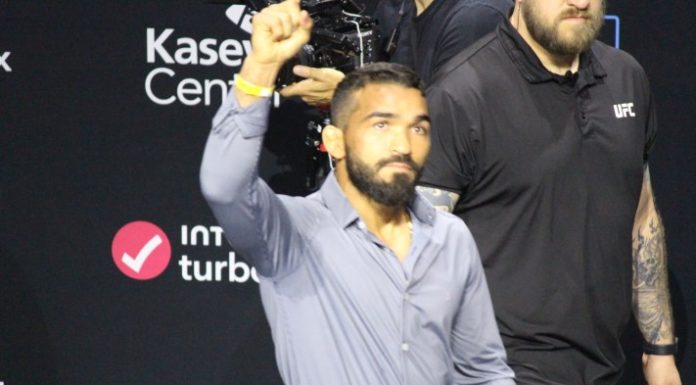Las Vegas, NV – UFC Vegas 59 lost a welterweight bout at the last second when Josh Quinlan was pulled from the event due to another positive test for the banned substance that earned him a 9-month suspension before.
UFC Senior Vice President of Athlete Health and Performance Jeff Novitzky spoke to Cageside Press among other media about the positive test and Quinlan on Saturday night.
“We got a call late yesterday afternoon that Josh’s most recent sample, collected I think July 23rd, came back for our old friend M3 Metabolite. Very small amount, under 100 picograms,” Novitzky told reporters during post-fight interviews at UFC Vegas 59.
Quinlan (5-0, 1NC) fought on Dana White’s Contender Series in Sept. 2021. Following the bout he tested positive for drostanolone and was suspended for 9-months.
When a fighter signed to the UFC, which Quinlan was even with the positive test, they are required to be in the USADA program and test negative for at least 6 months according to Novitzky.
“He was in the program for 10 months. That was the 15th sample that USADA had collected from him, and the one that comes back the night before he was supposed to fight tested positive,” Novitzky said.
“In none of those other 14 where the results came back were there any M3 metabolite, and we know quite a bit about the M3 metabolite now. Much more than 4 years ago when Jon Jones was going through it.”
Quinlan hasn’t been the sole case where he testes negative many times, but then positive for the M3 metabolite. Novitzky said there have been at least 10 UFC athletes that have had to deal with the same issue.
“We have literally hundreds of test and results concerning those athletes so we have a pretty good idea of what this substance look like and time after time after time we don’t see any evidence of continued use or exposure to it. You just see this metabolite and the theory there is that once you are exposed to it, whether intentionally or not, it’s going to be with you for a long period of time,” said Novitzky.
“If anything comes out of this it’s a good lesson. Not only for our UFC fighters, but for aspiring fighters.”
Novitzky mentioned that in speaking with MMA manager Jason House, Quinlan’s manager, he told him that he needs to tell his fighters that want to get into the UFC to start acting like it when it comes to what they put in their bodies.
“What you do now, even though you’re not in the UFC yet, you can end up paying for it later down the line (when) you get in. It’s one of the craziest substances that I’ve seen here,” he said.
Under the UFC’s program Quinlan’s levels, under 100 picograms, mean there is no real issue with him at this point and is not expected to face disciplinary action according to Novitzky.
“Any positive tests under 100 picograms is not automatically thrown out, but it becomes an atypical finding where USADA then goes and investigates it. If they don’t find any other evidence, which I didn’t hear, then it’s not an adverse finding,” Novitzky said.
“However that is not the Nevada commission rules, and even though this was a USADA/UFC test, we always share our testing results with Nevada. Specially in situations like this. Nevada’s precedent is they like to have these hearings, these public hearings, to go through it.”
Novitzky said he expects Quinlan to have to meet with the Nevada State Athletic Commission (NSAC) at a hearing to see if he will have to enter the NSAC program which requires athletes to be tested twice a month for 6 months and be under 100 picograms of the M3 metabolite.
“Nevada did not suspend him nor did they tell me they have plans to do so.”
NSAC did tell Novitzky that they are comfortable having Quinlan fight elsewhere.
Jason Witt vs. Josh Quinlan was officially moved to UFC San Diego on August 13th.
Watch the entire media scrum with UFC Senior Vice President of Athlete Health and Performance Jeff Novitzky above.




















